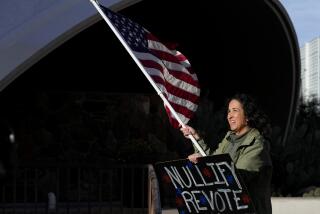Congress an Old Hand at Recounts
- Share via
WASHINGTON — For all the commotion over the presidential recounts in Florida, hand recounts in congressional races are hardly a rarity. Some lawmakers even wear them as a badge of honor.
Consider Tom Daschle of South Dakota and Harry Reid of Nevada, the Senate’s top two Democrats.
Daschle, the minority leader, this week reminisced on the Senate floor about his first campaign for the House in 1978, in which he trailed by 28 votes then led by 14 and finally won by 110--with hand recounts and legal action playing critical roles.
And Reid, the minority whip, held a news conference to review his 428-vote reelection victory in 1998 over a Republican who had requested hand recounts. “I believed then and I believe now that a full and accurate recount was in the best interests of the electorate,” Reid said.
This year, a handful of House and Senate elections may be subject to recounts in New Jersey, Minnesota, Michigan and Washington state. And hand counts may play a role in some or all of them.
Hand Recount Set for Florida House Race
One disputed House race in southern Florida already has moved to the hand-recount stage. In the 22nd Congressional District, Rep. E. Clay Shaw Jr.--the apparent Republican winner--faces a challenge from Democrat Elaine Bloom. The Miami Herald reported Wednesday that Bloom, behind by nearly 600 votes, had sought and obtained a hand recount in Miami-Dade County.
Such evidence on the congressional level indicates that the custom of verifying election outcomes by hand has wide acceptance in U.S. politics--on both sides of the aisle--even as Republican candidate George W. Bush’s presidential campaign insists that further hand counts now in Florida would undermine the legitimacy of the eventual result.
In California, hand audits of selected ballots actually are required to verify machine-calculated returns. And the state has seen several hand recounts--or requests for hand recounts--in recent years in elections ranging from mayoral races in Malibu and Berkeley to races for Congress. Conny McCormack, the Los Angeles County registrar-recorder, recalled a hand recount in the 1990 race in which Randy “Duke” Cunningham (R-San Diego) was elected to the House.
Then there was the epic 1996 contest in Orange County in which Loretta Sanchez (D-Garden Grove) unseated Rep. Robert K. Dornan (R-Garden Grove). Dornan requested a hand recount that netted him few gains in his quest to reverse a margin of defeat of nearly 1,000 votes.
“All over the country, people do hand recounts,” said McCormack, who has worked as an election official in Dallas, San Diego and Los Angeles. “I mean, this is the way they do recounts.”
Counting by hand, McCormack said, rarely reverses an outcome but can be therapeutic for losing candidates. “A lot of the reason they want recounts is they want to bring closure. They want to actually see the ballot. Why shouldn’t they get to see them?”
Capitol Hill aides say there are no comprehensive records kept on how many members of the House and Senate have survived recounts, by hand or machine. But anecdotal evidence suggests the numbers are not small.
“Every congressional election year, there are usually four to seven races that are so close they go to either partial or full recounts,” said Norman J. Ornstein, a congressional scholar. “They’re not only done, but they’re done frequently enough. And clearly, there are lots of places where hand recounts are specified as a method of resolving disputes or [are] the preferred method.”
On the Bush campaign’s contention that ongoing hand recounts in Florida requested by Democratic candidate Al Gore are subject to bias, Ornstein said: “If the numbers were reversed, it would be the Republicans asking for hand recounts and Democrats saying they were not reliable. There’s no moral high ground here.”
Some congressional contests have been so close that the House and Senate--final arbiters in disputes concerning their respective elections--have gotten involved. After the 1984 elections, the House Democratic majority found that a Democratic incumbent in Indiana had won a disputed election by four votes--reversing a state decision and prompting howls from the Republican minority.
Ten years earlier, the Senate became embroiled in a counting dispute after a New Hampshire election in which a Republican claimed a seat with a margin of a mere two votes. Eventually, the Senate threw up its hands and refused to seat either candidate. A new election was ordered, and the Democrat won.
Democrat Sanchez Didn’t Fight Recount
Lawyers who have represented Republican and Democratic candidates during recounts say that hand counting can be done fairly. While she fought him on other allegations, Sanchez did not challenge Dornan’s request for a hand recount, said her Democratic attorney, Wylie Aitken.
Ralph G. Elliot was an attorney for Republican Edward W. Munster in a disputed 1994 House election in Connecticut. Munster lost an election that year to Democratic Rep. Sam Gejdenson by a mere 21 votes after recounts, including recounts of absentee and provisional ballots by hand.
“It can work in an impartial way if there are enough eyes of all interested parties looking at the same things at the same time, so that the decision to be made on each ballot is made jointly by a Democrat and a Republican,” Elliot said.
Above all, he said, accurate hand recounting requires something conspicuously missing from the scene in Florida: “You need an atmosphere of calm.”
More to Read
Get the L.A. Times Politics newsletter
Deeply reported insights into legislation, politics and policy from Sacramento, Washington and beyond. In your inbox twice per week.
You may occasionally receive promotional content from the Los Angeles Times.










